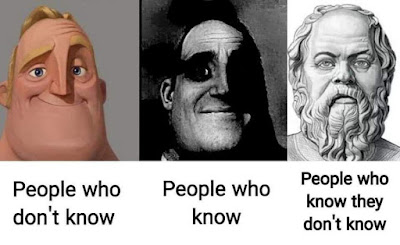Dear reader, the last month has been ... a lot. I lost two friends in October, and then there was the US election (I wrote about the election and Plato beforehand, and post-election thoughts may be coming soon). I admit I've had trouble finding the energy and time to do much with the blog lately (although I keep reminding myself that my tenth blog-aversary is coming next month!). Part of my blog-based reticence has been dealing with the aforementioned events. Some of it is that I've just been busy: there was Halloween, the election, and then in the last week, my Horror and Philosophy students had their film festival showcasing their short philosophical horror films (which were great!), and then the next day I went with a friend to Charlotte, NC to see Iron Maiden in concert for the first time since 2010 (see below for more on that experience!). One might say that I've been living a random life. Which of course calls for more random thoughts! And memes!

677. Philosophy is not about finding answers, it’s about expanding the conceptual field in which answers may—or may not—be found.
678. Some ideals that have improved my life in my attempt to live up to them:
- To be curious without being obsessive.
- To love without being possessive.
- To care without making it about me.
- To be open without being gullible.
679. “Technology always makes your life better” has to be one of the biggest untruths in the human history.
680. US Presidential elections tend to be decided by a small handful of the least informed, least engaged voters in a handful of swing states that disproportionally matter because of a bizarre, antiquated system of the Electoral College. Is this the best democracy we can do for an election that has such far-reaching effects on most of the world?
[NOTE: I had this thought before the election. The results have not changed much of my thinking.]
681. For me the worst philosophical sin is not being wrong, or even making logical errors. It is being dogmatic. Although I try not to be dogmatic about this.
682. I think one reason why I take mysticism seriously at least as something like a hypothesis (“it could be this way”) is that it does seem to me, even in regular perception and thought, that there may be some core of experience beyond linguistic conceptualization, beyond the dualism of self and other, mind and world – perhaps even beyond logic, whatever that might mean. It seems to me that the universe vastly outstrips the ability of our human cognitive apparatus to lay claim to it. It would be epistemic hubris to assume otherwise. The universe simply does not owe us anything, either cognitively or morally. Instead, we should become, as Ursula Le Guin once said, “realists of a larger reality.”

683. One of many things that makes me fit uncomfortably into the contemporary discipline of philosophy is that I don’t see philosophy as a “discipline” in the sense of something like a body of knowledge that could be encased in a “canon” about which one should seek to don the mantle of authority (often as an overcompensation for one’s sense of insecurity about not knowing enough about this body of knowledge). For example, students and scholars should read Plato’s Republic, not primarily because it contains a body of knowledge or even mainly because it has historically influenced several major philosophical traditions (Hellenistic, Byzantine, Islamic, and “Western”), but because reading a text as rich as the Republic encourages the reader to ask their own questions about themselves, humanity, and the universe. History of philosophy in multiple traditions is thus not something you learn to show off how much you know or even primarily to understand intellectual history, but it's one of the best ways to get outside of the tyranny of one’s present time and place to ask odd questions and see things from new angles. In this way, I see philosophy as continuous with literature, art, or thoughtful, reflective science: it’s a way to be a better, or at least more interesting, human. And the weirder the better!

684. There’s too much at stake in this life to take it entirely seriously.
685. Why do so many outdoor music festivals happen during the hottest part of the afternoon with no shade and no free water? Are they trying to kill their attendees?

686. One way skeptical thinking has made me more open-minded: reflecting on the idea that my own perspectives and my own experiences need not be continuous with the complete and objective truth about all things. In fact, they almost certainly are not, which is a good thing! Reality is infinitely vaster and more interesting once you stop subjecting it to the Procrustean bed of your conceptual schemes and expectations.
687. Another source of the malaise of many contemporary societies (related to my critique of the sort of unreflective relativism endemic to college students and others): we’ve flattened philosophical issues into sociological issues, ejecting substantive normative discussions into the realms of mere whims or worse—power relations.

688. Plato says (though the character of Socrates in the Republic) that democracy values freedom above everything, and he has a point, especially in a society like the early 21st century US where we value freedom above all—equality, decency, wellbeing, and even kids’ lives. But maybe this only happens because we narrowly define “freedom” as “freedom from”? What if we redefined it as “freedom to”? Freedom to live a fulfilling, safe, stable life? What would a democracy look like if its members were free to be flourishing human beings capable of fully participating in a democratic society?
689. My opinion about every war is that it should end immediately, and the immature, short-sighted old men who started and perpetuated the war should relinquish control in favor of leaders who will not allow children and innocent people to die for their political aims.
690. I’m at peace with the idea of my own death (or so I say now, anyway, when imagined as an eventuality rather than an imminence). It’s other people’s deaths that bother me. That’s the rending melancholy of grief, I suppose.
691. The madness of humanity: life with its sickness, old age, and death is horror enough all on its own, and then we add cruelty, exploitation, and violence as if making other people’s existence painful will do anything to lessen our own pain.
692. Imagine being personally bothered by other people’s gender or sexuality. Weird.
693. I’ve said this many times, but I think it often: one of the deepest sorrows of mortality is all the books I will never read.
694. And another thing: no, I still don’t want to download another app.
695. Sure, life is a vale of tears, but it’s also a barrel of monkeys.
696. None of us are in this life forever, but we're lucky our lives intertwine as fleetingly as they do.
697. The most difficult students are not those who are ignorant, but those who think they already know everything worth knowing.
698. Air travel says a lot about our society today: the only way to be comfortable is if nobody is right next to you or if you can afford first class, and lots of us can’t afford it at all.
699.One of the hardest things about grief is that the world goes on despite all indications that it should not.
700. Dear other drivers: the more you crowd me to get me to speed up on residential streets, the more I indulge my impulse to drive the speed limit just to spite you.
701. The faster you drive, the more likely you are to kill somebody. Slow down, people.

702. I don’t dislike AI as technology, but I’m bothered that its biggest proponents these days seem to be mega-corporations looking for more efficient ways to exploit everyone and students who want to cheat on writing assignments. I’m also worried about the environmental costs of energy, water, etc., and what it might do to us as human beings. But I think my deepest attitude is more puzzled indifference: we just don’t really need this technology.
703. We have become too obsessed with knowing and not interested enough in finding out.

704. “This makes no sense in terms of normal politics.” That’s because we haven’t had “normal politics” for at least ten years, maybe longer. It’s time for something different. Maybe paranormal politics? We have to admit that people are haunted by anger and fear no matter irrational we think this anger and fear may be. And we need to exorcise these fears—we need to become political ghostbusters.
705. I guess I shouldn’t be surprised, but it’s funny that my tastes in podcasts are also weird. Sure, everyone wants to talk about mainstream shows hosted by celebrities with lots of big budget ads, but I’d rather stick with my weird niche entertainment and philosophy shows.

706. One reason people talk about “the economy” all the time is that money is the only thing you’re really allowed to care about in our capitalist society—or at any rate the only sphere in which it’s even coherent to claim to be publicly objective and rational. Everything else is relegated to fuzzy “subjective” personal preference beyond all rational evaluation: citizenship, value, relationships, art, even religion. None of this is to say that people don’t have legitimate concerns about economic issues in a society where the difficulty of being alive for most people increases every year no matter how well rich people are doing in the stock market. But full human beings should be able to discuss things besides just “the economy.”
707. It has been said that fascism works by numbing all joy and hope. Perhaps it does this the same way as any exploitative ideology: by convincing us that it’s “natural” or “inevitable” or that there’s no point in resisting. But there’s nothing natural about human life devoid of joy, hope, love, and caring about other people. There’s nothing inevitable about the current way of doing things. All things change. You can’t change everything. But you can change something.
708. I guess mustaches and mullets aren’t even ironic anymore.
709. Screaming blissfully at an Iron Maiden show… if only more of the world could know such joy! Maybe heavy metal can make the world a better place? Or whatever art gets you out of the numbing drudgery of your own head. This must be why head banging is so effective!
710. I’m never going to read all the books I want to read, but that doesn’t mean I shouldn’t try to read some of them—a thought on reading and the other parts of life, too.




















No comments:
Post a Comment